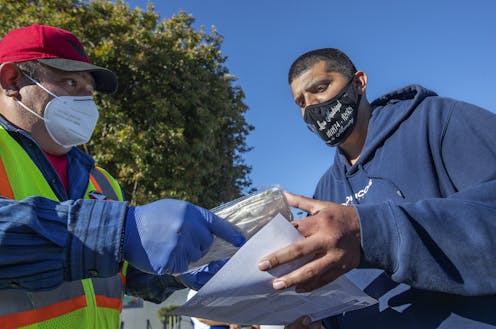Having COVID-19 or being close to others who get it may make you more charitable
- Written by Nancy R. Buchan, Associate Professor of International Business, University of South Carolina

The Research Brief[1] is a short take about interesting academic work.
The big idea
People who got COVID-19 or were directly affected by the disease, either by losing loved ones or having close friends or relatives become infected by the coronavirus, are more likely to give to a charity to support pandemic relief.
That was one of the main findings from an online study[2] we conducted[3] in May 2020 with[4] 932 adults living in the United States and replicated in June of that year with 723 adults who reside in Italy. Three other researchers worked on this experiment with us: Adriana C. Pinate[5], Giulia Urso[6] and Marilynn B. Brewer[7].
Our team told participants they would be paid US$3 to take a survey regarding their experiences and decision-making during the COVID-19 pandemic. Afterwards, we gave them a $5 bonus and asked if they wanted to donate some or all of the bonus money to charities supporting COVID-19 relief in their state or region, their own country or around the world. Italians got the equivalent in euros for the base payment and bonus. We told participants we would match any amount donated.
We found that people in the U.S. who were more directly affected by COVID-19 pandemic were 9% more likely to donate than others. They also donated 9.2% more money. The results were similar in Italy.
About 63% of the U.S. and 77% of the Italian participants gave away at least some of this unexpected money. Overall, people taking part in the study gave away 35% of their bonus and kept 65% for themselves. Nearly 20% gave away their entire bonus.
It also turned out that people in both countries were more likely to select a charity in their own state or region, rather than a national or global one. This reflects something prior research has found: People prefer to support their own communities when they make charitable donations, particularly during pandemics[8].
Interestingly, those who selected a global charity gave more money.
Our findings also suggest that having COVID-19 or seeing its toll up close through friends and loved ones makes the reality of the pandemic more certain and the need for charity more obvious.
Why it matters
U.S. charitable giving rose 3.8% to a record $471 billion[9] in 2020. And most Americans found ways to express generosity[10] during the early months of the COVID-19 pandemic, whether by donating, volunteering, going out of their way to keep local businesses afloat or other means.
That growth in support reflects a common refrain[11] during the COVID-19 pandemic[12]: “We’re all in this together[13].” We wanted to learn what that catch phrase actually means. That is, who do people mean by “we”? Whom do they want to help?
We also wanted to see if that sentiment would affect altruism[14]: the tendency to act selflessly to help others.
[Research into coronavirus and other news from science Subscribe to The Conversation’s new science newsletter[15].]
In meeting any global challenge, it’s worth considering evidence that people tend to be most interested in causes that directly affect their own interests or help their local communities – even when crises are worldwide in nature.
We believe our findings may point to one reason why it has proven hard for governments to work together[16] in the fight against COVID-19.
What other research is being done
Other scholars are also studying the degree to which people are expressing altruism in response to the COVID-19 pandemic. Their findings suggest that older people in several countries seem to be more altruistic than others in response to the pandemic, but also that older people also are more likely to give to charities closer to them[17]. Additional research shows that people who experience feelings that they could die from COVID-19 are more altruistic[18].
What’s next
We also collected data about how political affiliation may affect charitable giving. We will relay those findings in another study.
References
- ^ Research Brief (theconversation.com)
- ^ an online study (doi.org)
- ^ conducted (scholar.google.com)
- ^ with (scholar.google.com)
- ^ Adriana C. Pinate (www.researchgate.net)
- ^ Giulia Urso (scholar.google.com)
- ^ Marilynn B. Brewer (scholar.google.com)
- ^ particularly during pandemics (doi.org)
- ^ U.S. charitable giving rose 3.8% to a record $471 billion (theconversation.com)
- ^ most Americans found ways to express generosity (theconversation.com)
- ^ common refrain (news.sanfordhealth.org)
- ^ COVID-19 pandemic (www.wbur.org)
- ^ We’re all in this together (www.thedartmouth.com)
- ^ see if that sentiment would affect altruism (greatergood.berkeley.edu)
- ^ Subscribe to The Conversation’s new science newsletter (theconversation.com)
- ^ hard for governments to work together (www.theweek.co.uk)
- ^ more likely to give to charities closer to them (doi.org)
- ^ feelings that they could die from COVID-19 are more altruistic (doi.org)

















